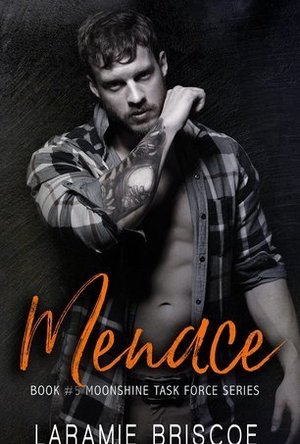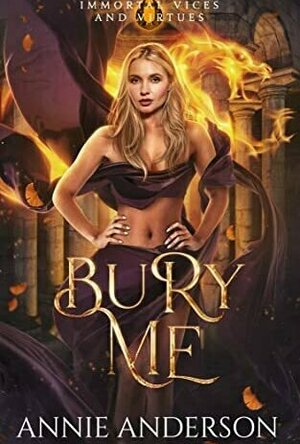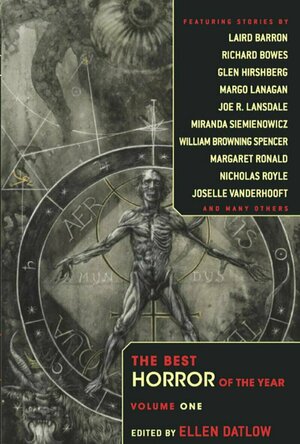
Police Radio - Mobile Scanner
News and Utilities
App
ABOUT THE APP: Police Radio is a fast & easy to use application for listening to live Police, Fire,...

Menace (Moonshine Task Force #5)
Book
Mason “Menace” Harrison “Single and ready to mingle……” Those are the words above...

Bury Me (Immortal Vices and Virtues: Her Monstrous Mates #6)
Book
The world ended the night I was born. Coincidence? I think not. Stuck living in the catacombs...
Reverse Harem Steamy Paranormal Romance Why Choose?

Jumia: Sell & Buy
Shopping and Lifestyle
App
Jumia is the largest marketplace in Africa. Download the app now and connect with thousands of...

Crypto News (Bitcoin,Ethereum)
News and Finance
App
Crypto News application for iOS collects exclusively fresh news about cryptocurrencies and...

HuntWise: A Better Hunting App
Navigation and Weather
App
You’re invited to take part in the best hunting app community out there! Share hunting experiences...
Lyndsey Gollogly (2893 KP) rated The Best Horror of the Year Volume 1 in Books
Apr 30, 2021
Book
The Best Horror of the Year Volume 1
Edited by Ellen Datlow
Once read a review will be written via Smashbomb and link posted in comments!
I will post in comments a short comment on each story!
An Air Force Loadmaster is menaced by strange sounds within his cargo; a man is asked to track down a childhood friend... who died years earlier; doomed pioneers forge a path westward as a young mother discovers her true nature; an alcoholic strikes a dangerous bargain with a gregarious stranger; urban explorers delve into a ruined book depository, finding more than they anticipated; residents of a rural Wisconsin town defend against a legendary monster; a woman wracked by survivor's guilt is haunted by the ghosts of a tragic crash; a detective strives to solve the mystery of a dismembered girl; an orphan returns to a wicked witch's candy house; a group of smugglers find themselves buried to the necks in sand; an unanticipated guest brings doom to a high-class party; a teacher attempts to lead his students to safety as the world comes to an end around them...
What frightens us, what unnerves us? What causes that delicious shiver of fear to travel the lengths of our spines? It seems the answer changes every year. Every year the bar is raised; the screw is tightened. Ellen Datlow knows what scares us; the twenty-one stories and poems included in this anthology were chosen from magazines, webzines, anthologies, literary journals, and single author collections to represent the best horror of the year.
Legendary editor Ellen Datlow (Poe: New Tales Inspired by Edgar Allan Poe), winner of multiple Hugo, Bram Stoker, and World Fantasy awards, joins Night Shade Books in presenting The Best Horror of the Year, Volume One.
1. Cargo by E.Michael Lewis
So chilling and so sad! This is short I dedication to the families of those children in Jonestown and the men and women who brought the bodies home.
2. If Angels Fight by Richard Bowes
This is about a man searching for his friend who was possessed by an Angel. On this journey you see and find out that this Angel left his friend and left a trail behind him to follow. His family never gave up he managed to find his friend and Angel Michael and return him to his home one last time. Only question was did he bring him home to find his sister to posses or to say goodbye to his mother?.
3. The Clay Party by Steve Duffy
A group of settlers embark on a journey for a new life in California in 1846, the journey does not go as expected. I was a bit bored at the beginning but certainly had a twist at the end.
4. Penguins of the Apocalypse by William Browning Spencer
This is brilliant! A man fighting his personal battles with alcohol! Now is the pulka and penguin freedom movement real or a fragment of his imagination while under the influence? Either way it was entertaining!
5. Esmeralda by Glen Hirshberg
This is a very strange little story involving the end of all books,pens and paper! Very odd!
6. The Hodog by Trent Hergenrader
A good old fashioned urban legend!
7. Very Low Flying Aircraft by Nicholas Royle
Not one for me didnt really grip me.
8. When the Gentlemen Go By. By Margaret Ronald
This was a bit chilling and I would love to have read more about these “Gentlemen” who come at night to make bargains!
9. The Lagerstatte by Laird Barron
Grief does strange things to our minds and body! This was quite chilling.
10. Harry and the Monkey by Euan Harvey
This really plays on every fear a parent has when their kids go missing especially in a place and time where children are vanishing!
11 Dress Circle by Miranda Siemeinowicz
12. The Rising River. By Daniel Kaysen
This was strange and after reading it I’m still not sure what’s happening 😂😂
13 Loup-Garou by R.B. Russell
I enjoyed this strange litte story set in my hometown of Birmingham. A little french film causes a little drama in this mans life.
14. Girl in pieces by Graham Edwards
This was my favourite! So far fetched into a world of monsters a detective helps a Golum save a girl cut to pieces! So much fun
15 It washed up by Joe R. Lonsdale
Wow how to pack a punch in 2 pages! Loved it!
16 The Man from the Peak by Adam Golaski
Brilliant short full of mystery blood and gore! Very well written.
17. The Narrows by Simon Bestwick
This actually chilled me I’d hate sending my child to school and have something like this happen which of course is totally possible.
I loved this book of small tales and discovering those writers I wouldn’t normally be exposed too!
Cody Cook (8 KP) rated Writings Of Thomas Paine Volume 4 (1794 1796); The Age Of Reason in Books
Jun 29, 2018
The book seems to have had three major objectives: the support of deism, the ridicule of what Paine found loathsome in Christian theology, and the demonstration of how poor an example the Bible is as a reflection of God.
In a sense, Paine's arguments against Christian theology and scripture were meant to prop up his deistic philosophy. Paine hoped that in demonizing Christianity while giving evidences for God, he would somehow have made the case for deism. But this is not so. If Christianity is false, but God exists nonetheless, we are not left only with deism. There are an infinite number of possibilities for us to examine regarding the nature of God, and far too many left over once we have eliminated the obviously false ones. In favor of deism Paine has only one argument—his dislike of supernatural revelation, which is to say that deism appeals to his culturally derived preferences. In any case, Paine's thinking on the matter seemed to be thus: if supernatural revelation could be shown to be inadequate and the development of complex theology shown to be an error, one could still salvage a belief in God as Creator, but not as an interloper in human affairs who required mediators.
That being said, in his support of deism, Paine makes some arguments to demonstrate the reasonableness in belief in, if not the logical necessity of the existence of, God which could be equally used by Christians.
For instance, just as the apostle Paul argued in his epistle to the Romans that, "what can be known about God is plain to [even pagans], because God has shown it to them. For his invisible attributes, namely, his eternal power and divine nature, have been clearly perceived, ever since the creation of the world, in the things that have been made" (Romans 1:19-20, ESV), so also Paine can say that, "the Creation speaketh an universal language [which points to the existence of God], independently of human speech or human language, multiplied and various as they be."
The key point on which Paine differs from Paul on this issue is in his optimism about man's ability to reason to God without His assisting from the outside. Whereas Paul sees the plainness of God from natural revelation as an argument against the inherent goodness of a species which can read the record of nature and nevertheless rejects its Source's obvious existence, Paine thinks that nature and reason can and do lead us directly to the knowledge of God's existence apart from any gracious overtures or direct revelation.
On the witness of nature, Paine claims, and is quite correct, that, "THE WORD OF GOD IS THE CREATION WE BEHOLD: And it is in this word, which no human invention can counterfeit or alter, that God speaketh universally to man." What is not plainly clear, however, is that man is free enough from the noetic effects of sin to reach such an obvious conclusion on his own. Indeed, the attempts of mankind to create a religion which represents the truth have invariably landed them at paganism. By paganism I mean a system of belief based, as Yehezkel Kaufmann and John N. Oswalt have shown, on continuity.iv In polytheism, even the supernatural is not really supernatural, but is perhaps in some way above humans while not being altogether distinct from us. What happens to the gods is merely what happens to human beings and the natural world writ large, which is why the gods are, like us, victims of fate, and why pagan fertility rituals have attempted to influence nature by influencing the gods which represent it in accordance with the deeper magic of the eternal universe we all inhabit.
When mankind has looked at nature without the benefit of supernatural revelation, he has not been consciously aware of a Being outside of nature which is necessarily responsible for it. His reasoning to metaphysics is based entirely on his own naturalistic categories derived from his own experience. According to Moses, it took God revealing Himself to the Hebrews for anyone to understand what Paine thinks anyone can plainly see.
The goal of deism is to hold onto what the western mind, which values extreme independence of thought, views as attractive in theism while casting aside what it finds distasteful. But as C.S. Lewis remarked, Aslan is not a tame lion. If a sovereign God exists, He cannot be limited by your desires of what you'd like Him to be. For this reason, the deism of men like Paine served as a cultural stepping stone toward the atheism of later intellectuals.
For Paine, as for other deists and atheists like him, it is not that Christianity has been subjected to reason and found wanting, but that it has been subjected to his own private and culturally-determined tastes and preferences and has failed to satisfy. This is the flipside of the anti-religious claim that those who believe in a given religion only do so because of their cultural conditioning: the anti-religionist is also conditioned in a similar way. Of course, how one comes to believe a certain thing has no bearing on whether that thing is true in itself, and this is true whether Christianity, atheism, or any other view is correct. But it must be stated that the deist or atheist is not immune from the epistemic difficulties which he so condescendingly heaps on theists.
One of the befuddling ironies of Paine's work is that around the time he was writing about the revealed religions as, “no other than human inventions set up to terrify and enslave mankind, and monopolize power and profit," the French were turning churches into “temples of reason” and murdering thousands at the guillotine (an instrument of execution now most strongly identified with France's godless reign of terror). Paine, who nearly lost his own life during the French Revolution, saw the danger of this atheism and hoped to stay its progress, despite the risk to his own life in attempting to do so.
What is odd is that Paine managed to blame this violent atheism upon the Christian faith! Obfuscated Paine:
"The Idea, always dangerous to Society as it is derogatory to the Almighty, — that priests could forgive sins, — though it seemed to exist no longer, had blunted the feelings of humanity, and callously prepared men for the commission of all crimes. The intolerant spirit of church persecution had transferred itself into politics; the tribunals, stiled Revolutionary, supplied the place of an Inquisition; and the Guillotine of the Stake. I saw many of my most intimate friends destroyed; others daily carried to prison; and I had reason to believe, and had also intimations given me, that the same danger was approaching myself."
That Robespierre's deism finally managed to supplant the revolutionary state's atheism and that peace, love, and understanding did not then spread throughout the land undermines Paine's claims. Paine felt that the revolution in politics, especially as represented in America, would necessarily lead to a revolution in religion, and that this religious revolution would result in wide acceptance of deism. The common link between these two revolutions was the idea that the individual man was sovereign and could determine for himself what was right and wrong based on his autonomous reason. What Paine was too myopic to see was that in France's violence and atheism was found the logical consequence of his individualistic philosophy. In summary, it is not Christianity which is dangerous, but the spirit of autonomy which leads inevitably into authoritarianism by way of human desire.
As should be clear by now, Paine failed to understand that human beings have a strong tendency to set impartial reason aside and to simply evaluate reality based on their desires and psychological states. This is no more obvious than in his own ideas as expressed in The Age of Reason. Like Paine's tendency to designate every book in the Old Testament which he likes as having been written originally by a gentile and translated into Hebrew, so many of his criticisms of Christian theology are far more a reflection upon himself than of revealed Christianity. One has only to look at Paine's description of Jesus Christ as a “virtuous reformer and revolutionist” to marvel that Paine was so poor at introspection so as to not understand that he was describing himself.
There is much more that could be said about this work, but in the interest of being somewhat concise, I'll end my comments here. If you found this analysis to be useful, be sure to check out my profile and look for my work discussing Paine and other anti-Christian writers coming soon.

Pic Scanner Gold: Scan photos and picture albums
Utilities and Photo & Video
App
Pic Scanner Gold makes scanning FAST and EASY. Check out its amazing features. So many ways to scan,...

Jack’d - Gay Chat & Dating
Dating, Lifestyle and Social Networking
App
Jack’d is the most diverse and authentic app for gay, bi and curious guys to connect, chat, share,...

